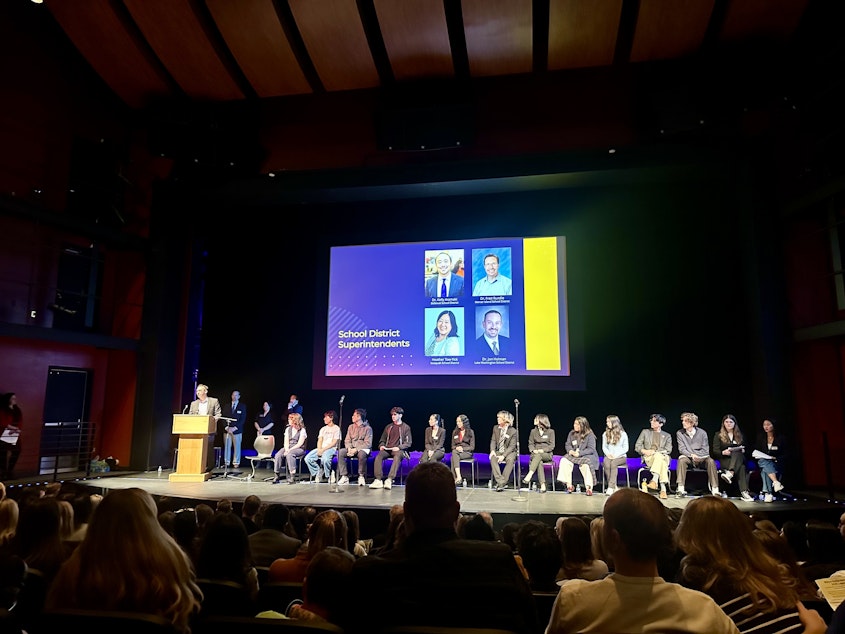'We are at a crisis.’ Seattle Eastside schools call for increased state funding

With lawmakers headed back to Olympia next week, school districts across Washington state are calling for a massive funding boost — and five on Seattle's Eastside joined forces this week to bring their issues to lawmakers.
Wednesday's event at Sammamish High School in Bellevue was marketed as a town hall on the state's education funding crisis. But it felt more like a pep rally, as more than 450 people packed the school auditorium to fight for more money for public education.
This comes as many school systems across Washington grapple with major budget deficits — fueled by declining enrollment, spiking costs to operate schools, and chronic underfunding at the state level.
RELATED: Seattle Public Schools' budget woes continue
At the town hall — hosted jointly by the Bellevue, Mercer Island, Lake Washington, Issaquah, and Renton school districts and their parent-teacher associations — students, parents, and educators took turns telling stories about how a lack of state funding has affected them.
Bellevue schools Superintendent Kelly Aramaki said it's "unconscionable" that the state doesn't cover the full cost for special education.
Sponsored
The state limits how much money districts can get for students who receive special education services with a cap set at 16%. That means, even if over 16% of a district's student population is identified as needing special education services, that district wouldn't receive any extra funding from the state.
"That's just not OK," Aramaki said, "because one, our kids with disabilities deserve the very best education. And two, the state, if they believe that education is their paramount duty, they should be funding special education to that level."
In Bellevue's last budget, state funding for special education fell about $35 million short last year, and the district had to make up the difference. Since 2020, the district has had to chip in over $130 million for special education, beyond state funding.
The issue is personal to Aramaki. His sister has Rett syndrome, a rare genetic disorder, and received special education services in Bellevue schools from kindergarten to age 21.
"If you know somebody, love somebody who has special needs and is going through the education system, you know that it's very challenging," Aramaki said. "There's a lot of struggle and the most important factor in their success are the teachers in the classroom."
Sponsored
He added: "Funding of special education as part of our paramount duty is absolutely critical."
RELATED: Bellevue’s first Asian American superintendent reflects on his family’s 120-year US journey
Education advocates also want the Legislature to boost funding in two other key areas — transportation and MSOC (an acronym many school officials and activists use for materials, supplies and operating costs).
A report from the nonpartisan League of Education Voters this summer found that state funding in those areas aren't keeping pace with surging costs.
Rising costs at a time when student needs are also growing has led to educator burnout, said Juliana Dauble, president of the Renton School District's teacher's union.
Sponsored
Once a week, Dauble said she gets an email or a phone call from an educator asking how to get medical leave or resign their position because they feel they cannot return to work. They often tell her: "It's too much. The kids aren't OK; I'm not OK."
"We are at a crisis," Dauble said.
At the town hall, all nine state legislators in attendance expressed support for increased school funding. So did state Superintendent Chris Reykdal, who has proposed a $3 billion boost to public schools in his proposed two-year budget.
RELATED: WA's top education official requests additional $3 billion for public schools
But it may not be feasible this year, as the state faces a multi-billion dollar budget gap.
Sponsored
Dauble and many others at the town hall Wednesday said they support the creation of a new wealth tax to help cover a funding increase for schools — an idea outgoing Gov. Jay Inslee included in his budget proposal.
RELATED: Gov-elect Ferguson 'skeptical' of wealth tax, pitches broad cuts to address WA budget gap
Governor-elect Bob Ferguson said this week he opposes that idea, and isn't convinced it'll solve the state's budget woes. But he does want to allocate more of the state's budget to education.




